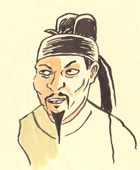Saturday, March 14, 2009
Tu-Fu Poetry
 TU-FU
712 - 770
Chinese Poet
TU-FU
712 - 770
Chinese Poet
Born into a scholarly family Tu Fu received a Confucian education but failed in the Imperial examination. As a result he spent much of his youth travelling, during which he met the famous poet Li Tai-po.
While Li Tai-po was Taoist in spirit Tu Fu remained devoutly Confucian. Tu Fu was deeply moved by the sorrow of his troubled times. His poems speak of the sad fate of the people, and his deep hatred of war.
Chinese poetry is much different than its Western counterpart. Each Chinese character is a word/picture. Because the characters have remained essentially unchanged for thousands of years, each holds an emotional charge and racial memory. The characters cascade down the page, each painting a picture, evoking an emotion. Each character builds on the last and acts as a foundation for the next. As you gaze upon the poem, you see the symbol for river. In the column next to the symbol for river is a snowy egret feeding among the rushes. As you enter deeper into the maze/poem, you hear the clatter of oxcart wheels on hard-packed dirt and smell the sweat of the animals as they pass. You see the sorrowful faces of conscripts trudging behind the cart. The quality of the author’s brushstroke imparts a nuance of meaning that is further enhanced by the quality of ink used, and the paper itself creates a subtext of thought. Chinese poetry is a three dimensional living thing that leaps off the page and enrobes you in its images and textures, leaving the reader with a memory that will be built upon by future poets.

Song of Lovely Women
Third day, third month festival, and the air fresh with spring; beside Serpentine Lake in Chang'an, many lovely women stroll. Their appearance is elegant, their thoughts lofty and refined, their complexions delicate, figures in perfect proportion. Their embroidered silk gowns glisten with spring light; golden peacocks and beasts of silver strut upon the fabric. What is it that they wear upon their heads? Jeweled headbands with kingfisher feathers, dangling to their hairlines. And what is it that we see upon their backs? Pearl-studded overskirts drawn tight at the waist. Among them are kin of the Pepper-flower Chamber* with its cloud-patterned curtains- the Duchesses of Guo and Qin, honored with the names of nations! A great roast of purple camel hump rises from a green cauldron, and crystal plates gleam with heaps of white-scaled fish. But the rhinoceros horn chopsticks,* long-sated, are slow to descend, and the belled knife-handles dance vainly above the roast. The flying steeds of the eunuchs hardly stir the dust, as they bear in eight exotic dishes from the Imperial Kitchens.
I'm never drinking again...
I spent part of the night hurling, some of the night in the bathtub trying to see straight...and I'm now intimate with the hallway floor...and finally made it to the bed to sleep without spinning....
*GAK* alcohol is poison...it should have a skull & crossbones on the label...
:)
Glad you survived.
xo
-Alice
Subscribe to Post Comments [Atom]
<< Home
Subscribe to Posts [Atom]


